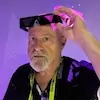
Welcome back to Spatial Beats. where we round up all the top news and happenings from around the spatial computing spectrum, including its escalating infusions with AI and other letters. Let’s dive in…
The Lede
CES, the largest trade show in the world, with 130,000 tickets sold already, descends on Las Vegas next week. Once called The Consumer Electronics Show, today CES would be better characterized as the consumer everything show. Anything with a transistor in it will be on display in Vegas next week. AI will be the star of the show again this year, as it has not yet reached peak hype. XR is well represented, and usually concentrated at the convention center, although startups can be found at the Sands/Venetian convention center. Sony Playstation, and PlaystationVR, have a huge footprint every year. Assisted Reality glasses, wearable displays for smartphones from XReal, Rokid, RayNEO, TCL, Lenovo, Virtue, and others will have an even bigger presence this year. Luxottica, maker of Meta’s Ray-Ban Stories, will have a booth featuring the newly updated smartglasses which don’t have a display, but will have an AI co-pilot.
Face Tech
Qualcomm Unveils Snapdragon XR2+ Chip for Mixed Reality. The company introduced the upgraded Snapdragon processor, designed specifically for virtual and mixed reality headsets. Qualcomm has been working with Google and Samsung on new AR glasses, which will potentially compete with Apple’s Upcoming Vision Pro. The XR2+ chipset can power twelve sensors and delivers 4K images to each eye.
Xreal ships 350K AR glasses in 2023, takes 51% of the market. The company announced today that it has shipped 350,000 AR glasses in 2023. This represents a 320% year-over-year growth rate and gives Xreal a 51% market share in Q3 2023. The company’s shift from the complex, expensive spatial computing of the XReal Light, to the lower-priced wearable display of the Air2, has paid off. XReal says it has not given up on spatial computing and promises to show its latest technology at CES next week.
The AI Desk
Mind-Reading AI Turns Thoughts Into Text. In a world-first, researchers from the GrapheneX-UTS Human-centric Artificial Intelligence Centre at the University of Technology Sydney (UTS) have developed a portable, non-invasive system that can decode silent thoughts and turn them into text. The technology could aid communication for people who are unable to speak due to illness or injury, including stroke or paralysis.
Good Fun
Microsoft brings hundreds of Xbox titles to the Meta Quest – with no console required. An extra controller is required, but Game Pass Ultimate is available for Quest headsets, expanding Microsoft’s cloud gaming footprint. Users can either play the game in a fully virtual environment or plop the virtual screen in their real-world environment using the Quest’s full-color Passthrough. There’s no game installation required, everything streams straight from the cloud.
How Alan Smithee traded his points in “Saturday Night Fever” for a new car. You see that car over there? That car cost me a million dollars. A true-ish story from the business we call show.
Weekend Reading
XR Year In Review, Most Important Stories of 2023 (Ben Lang/Road to VR)
Reality Check: Looking Back at Augmented Reality in 2023 (Tom Emrich/Linkedin Pulse)
How To Design Mixed Reality Experiences Like A Magician (Laura Mingial/UploadVR)
The Top Ten Stories of 2023 (Shelly Palmer)
Listen & Learn
This Week in XR is also a podcast hosted by Paramount’s Futurist Ted Schilowitz, Magic Leap founder Rony Abovitz, and Charlie Fink, the author of this weekly column. You can find it on podcasting platforms Spotify, iTunes, and YouTube.
 Charlie Fink is an author and futurist focused on spatial computing. See his books here. Spatial Beats contains insights and inputs from Fink’s collaborators including Paramount Pictures futurist Ted Shilowitz.
Charlie Fink is an author and futurist focused on spatial computing. See his books here. Spatial Beats contains insights and inputs from Fink’s collaborators including Paramount Pictures futurist Ted Shilowitz.
Header image credit: Jonah Pettrich on Unsplash






